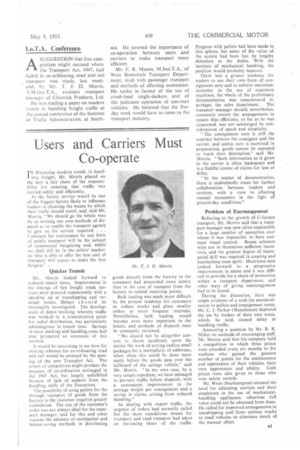Users and Carriers Must Co-operate
Page 35

If you've noticed an error in this article please click here to report it so we can fix it.
I N discussing modern trends in hand
ling freight, Mr. Morris placed on the user a fair share of the responsibility for ensuring that traffic was carried safely and efficiently.
in the future, service would be one of the biggest factors likely to influence traders in choosing the means by which their traffic should travel, and, said Mr. !/fords, "We should go the whole way by so revising our own methods of dispatch as to enable the transport agency to give us the service required. . . . Contracts for conveyance by any form of public transport will be the subject of commercial bargaining and, whilst we shall still be in the sellers' market, he who is able to offer the best unit of transport will expect to make the best bargain." .
Quicker Transit Mr. Morris looked forward to reduced transit times. Improvement in the timings of fast freight trunk services must proceed concurrently with a speeding up at transhipping and terminal points. Delays should be thoroughly investigated. The development of depot working, whereby traffic was trunked to a concentration point for radial distribution, was particularly advantageous in transit time. Savings in rates, packing and handling costs had also promoted an extension of this method.
it would be interesting to see how far existing schemes for co-ordinating road and rail would be arrested by the passing of the new Transp'Ort Act. The return of competition might produce the measure of co-ordination envisaged in the 1947 Act, but largely unfulfilled because of lack of support from the handling staffs of the Executives.
The possibility of using pallets for the through transport of goods from the factory to the customer required greater exploration. The size of the customer's order was not always ideal for the transport manager, and for this and other reasons the advance of mechanical and labour-saving methods in distributing goods directly from the factory to the consumer had proceeded more slowly than in the case of transport from the factory to central receiving points.
Bulk loading was made more difficult. by the present tendency for customers to reduce stocks and place smaller orders at more frequent intervals. Nevertheless, bulk loading would become even more important in the future, and methods of dispatch must be constantly reviewed.
" We should not be altogether content to throw needlessly upon the carrier the work of sorting endless small packages for a multiplicity of addresses, when often this could be done more easily before the goods pass over the tailboard of the cartage vehicle," said Mr. Morris. "In my own case, by a very simple expedient, we have managed to pre-sort traffic before dispatch, with a consequent improvement in the average weight per consignment and a saving in claims, arising from reduced handling."
In dealing with export traffic, the urgency of orders had normally called for the most expeditious means for transport and road transport had taken an increasing share of the traffic. Progress with pallets had been made in this sphere, but some of the value of the system had been lost by lengthy detention at the docks. With the increase of mechanical handling, the position would probably improve.
There was a greater tendency for traders to use their own form of consignment note and to achieve maximum economy in the use of expensive machines, the whole of the preliminary documentation was concentrated in,
perhaps, the sales department. The transport manager should, nevertheless, constantly review the arrangements. to ensure that efficiency, so far as he was . concerned, was not submerged by considerations of speed and simplicity.
"The consignment note is still the contract between the consignor and the carrier, and unless care is exercised in preparation, goods cannot be expected to reach their destination," said Mr. Morris. "Such information as is given to the carrier is often inadequate and is a fruitful source of claims for loss or delay.
"In the matter of documentation, there is undoubtedly room for further collaboration between traders and carriers, with a view to effecting mutual economies in the light of present-day conditions."
Problem of Encouragement
Referring to the growth of C-licence transport, Mr. Morris said that a trans port manager was now often responsible for a large number of operatives over whom it was impossible to have con stant visual control. Bonus schemes were not in themselves sufficient incentives, and the greatest degree of mana gerial skill was required in creating and maintaining team spirit. Most keen men looked forward to a progressive improvement in status and it was difficult to provide for a chain of promotion within a transport department. and other ways of giving encouragement had to be found.
During the discussion, there was ample evidence of a wish for standardi
zation in pallets and consignment notes. Mr. C. J. Parker (Manchester) deplored the use by traders of their own notes, which, he said, caused delay in handling traffic.
Answering a question by Mr. B. R. Miller on methods of encouraging staff, Mr. Morris said that his company held a competition in which three prizes were awarded every six month,s to the workers who gained the greatest number of points for the maintenance and appearance of their vehicles, their own appearance and ability. Cash prizes were also given to those who won safety awards.
Mr. Wren (Southampton) stressed the need for educating carriers and their employees in the use of mechanicalhandling appliances, otherwise full value could not be obtained from them. lie called for improved arrangements in transhipping coal from railway trucks to load vehicles to eliminate much of the manual effort.












































































